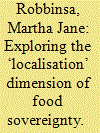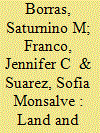| Srl | Item |
| 1 |
ID:
138455


|
|
|
|
|
| Summary/Abstract |
The ‘localisation’ narrative is at the heart of food sovereignty in theory and practice, in reaction to the ‘distance’ dimension in the dominant industrial food system. But while it is a central element in food sovereignty, it is under-theorised and largely unproblematised. Using the theoretical concepts of food regime analysis, uneven geographical development and metabolic rift, the author presents an
exploratory discussion on the localisation dimension of food sovereignty, arguing that not all local food systems are a manifestation of food sovereignty nor do they all help build the alternative model that food sovereignty proposes. The paper differentiates local food systems by examining character, method and scale and illustrates how local food systems rarely meet the ideal type of either food sovereignty or the capitalist industrial model. In order to address five forms of distance inherent in the global industrial food system, localization is a necessary but not sufficient condition for food sovereignty. A more comprehensive food sovereignty needs to be constructed and may still be constrained by the context of capitalism and mediated by the social movements whence it comes.
|
|
|
|
|
|
|
|
|
|
|
|
|
|
|
|
| 2 |
ID:
138463


|
|
|
|
|
| Summary/Abstract |
Land and food politics are intertwined. Efforts to construct food
sovereignty often involve struggles to (re)constitute democratic
systems of land access and control. The relationship is two-way:
democratic land control may be effected but, without a strategic
rebooting of the broader agricultural and food system, such
democratisation may fizzle out and revert back to older or trigger
newer forms of land monopoly. While we reaffirm the relevance of
land reform, we point out its limitations, including its inability to
capture the wide array of land questions confronting those implicated
in the political project of food sovereignty. Our idea of the land
framework of food sovereignty, described as ‘democratic land
control’ or ‘land sovereignty’, with working peoples’ right to land at
its core, is outlined, with a normative frame to kick-start a debate and
possible agenda for future research.
|
|
|
|
|
|
|
|
|
|
|
|
|
|
|
|